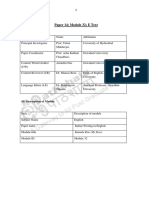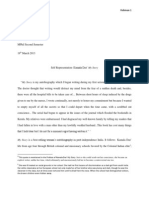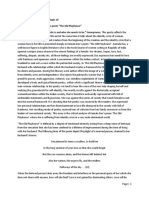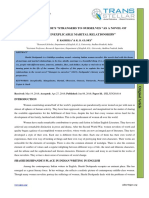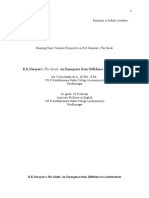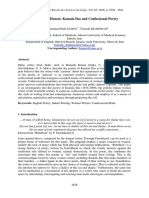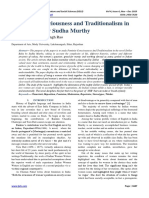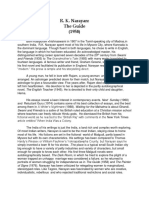B6831129219
B6831129219
Uploaded by
ROHIT SHARMACopyright:
Available Formats
B6831129219
B6831129219
Uploaded by
ROHIT SHARMACopyright
Available Formats
Share this document
Did you find this document useful?
Is this content inappropriate?
Copyright:
Available Formats
B6831129219
B6831129219
Uploaded by
ROHIT SHARMACopyright:
Available Formats
International Journal of Recent Technology and Engineering (IJRTE)
ISSN: 2277-3878, Volume-8 Issue-5, January 2020
Gender and Religion in Kamala Das’ Poetry
Siva Satyanarayana Jagarapu, Sushma Raj Saripelli, Ganeswara Rao Chintagunti, Shanice Anne
Thomas
Abstract: Kamala Das was one the illustrious poets in the grapples with ideas and abstractions, images of men and
history of Indian English literature. She represented a typical women on several planes, the complex of emotions centering
middle class Indian woman’s dual conflict of ideas through the round the human activities and problems relating to her own
portrayal of her own persona with the backdrop of Indian life and art.
culture in her versatile poetry. Kamala Das was a champion of
Das deeply craved for love and affection, which was of course
woman’s secret longings, aspirations and desires. Her poems are
full of her personal feelings as a woman and the realization of a mirage in her life. She suffered under a lustful husband, who
own self. The present paper focuses on the voice she lends for never cared for her desires. She dreamed about love and
every woman agonized in marriage and the reawakening of her security from the husband like every common woman, but in
soul, which she submits to God. her case it remained an unfulfilling dream. Because of her
man’s refusal to yield love, she continuously experimented to
Keywords : Aspirations, biographical elements, versatile poetry obtain love by embracing one man to another man’s arms. She
found nothing. Her quest for love was futile; besides this, she
I. INTRODUCTION realized that physical lust never compensated pure love.
It is clear that she has no sexual passion, but her deep
From time immemorial, Indian society and its men
disgust towards her husband’s prime importance for it drifted
have confined the women to kitchen and treated them as a
her to make up her mind to maintain extramarital relations and
sexual entity, a play toy, a material, a source of wealth, a
to be disloyal to him at least physically. Her frustrated heart
status symbol, an unpaid servant, a machine to produce
was poured out in many of her poems in her first three
children, a burdensome creature etc. The renowned poet
collections of poetry Summer in Calcutta (1965), The
Kamala Das too experienced these ill-treatments personally
Descendants (1967) and The Old Play House and Other
and her life was entangled around these labels.
Poems (1973) vividly.
Kamala Das has been considered one of the most
On the whole, many of her poems reflected her
illustrious contemporary Indian woman poets who expressed
personal life. Kamala Das’ autobiography My Story was so
a typical middle class Indian woman’s dual conflict of ideas
close to her poetry in theme and treatment. Both the genres, in
through the portrayal of her own persona in the backdrop of
fact, were the records of her life’s trials and tribulations. She
Indian life and culture in her versatile poetry, especially
lightened her heart through writing her life’s story and her
elevating or discussing the psycho-sexual aspects of her
own feelings in the form of poetry. So, one could observe that
middle-class womanhood and her conjugal life very candidly
her poems consisted her personal elements and impressions.
and boldly. Usually Indian women dared not speak on these
Some of her poems spoke of her attachment with people, and
issues.
places that had surrounded her and influenced her personal
life, and some other poems spoke of her inner psyche and its
II. DISCUSSION & RESULT ANALYSIS
conflict for undigested issues in her life, and a few poems
Most of her poems depict men and women in revealed her ambitions and poetic mission.
common Indian scenario. In this context, Dr. K. M. Pandey Mrs. Das’ poignant saga began with her early age
wrote in his essay “Kamala Das: A Study in Evolving Vision” which was neglected by her parents. Only the cook and her
as: elder brother took care of her, the former in the case of food
Born in Kerala, and brought up in Calcutta, while living in and the latter in carrying her to the European school. At
Delhi and Bombay at present, in a sense, she has felt the pulse school, she was discriminated by her fellow White boys and
of the whole India. Thus being rooted in Indian soil, she was sent to wait in the corridor behind lavatories when the
White dignitary visited it. During her childhood, she remained
lonely and depressed. When she was fifteen, her parents
Manuscript received on January 02, 2020. brought her marriage proposal with a man who was an
Revised Manuscript received on January 15, 2020. employer in the Reserve Bank of India. She was mortified by
Manuscript published on January 30, 2020. the lustful advances and sexual talks of her soon to be
* Correspondence Author
J.Siva Satyanarayana, Department of English, GSGS, GITAM
husband. She found him ungentlemanly, dispassionate and
University, Visakhapatnam, India, Email: sivajagarapu@gmail.com.or uncouth in his approach to her. He pleaded with her to bare
S.Sushma Raj*, Department of English, GSGS, GITAM University, her breasts and if she refused to do so, he turned brutal and
Visakhapatnam, India, Email: s.sushmaraj@gmail.com crude. Besides, he told her of his sexual exploits, which he
Ch.Ganeswara Rao, * Department of English, GSGS, GITAM
University, Visakhapatnam, India, Email:ch.ganeswararao77@gmail.com
shared with his maidservants at his home. All these shattered
Shanice Anne Thomas, Department of English, GSGS, GITAM her dreams she had of her husband; she longed to have a man
University, Visakhapatnam, India, Email:shanice.ranade21@gmail.com with traits of motherly love and fatherly concern, especially a
good companion who would drive her loneliness away. In this
© The Authors. Published by Blue Eyes Intelligence Engineering and
context she wrote:
Sciences Publication (BEIESP). This is an open access article under the
CC-BY-NC-ND license
(http://creativecommons.org/licenses/by-nc-nd/4.0/)
Retrieval Number: B6831129219/2020©BEIESP
DOI:10.35940/ijrte.B6831.018520 Published By:
Journal Website: www.ijrte.org Blue Eyes Intelligence Engineering
5699 & Sciences Publication
Gender and Religion in Kamala Das’ Poetry
I had expected him to be all that I wanted my father to be, and The love-less physical union with her husband made
my mother. I wanted conversation, companionship and her pregnant. She was sent to her parental home, Nalapat
warmth. Sex was far from my thoughts. I had hoped that he House in Malabar, when her health declined due to
would remove with one sweep of his benign arms the continuous vomiting. But later she gave birth to a lovely male
loneliness of my life… (My Story, P 80) child. She expected her husband’s visit eagerly, but his arrival
Her life was planned by her father and her relatives even made her unhappy and restless, as he paid no heed to her or
without considering her feelings on marriage and the their newborn son. Besides, he talked to her for only a
bridegroom. In other words, she had no choice and the moment and with indifference, and spent most of the time
marriage was held against her wishes. In her own words, Das with his cousins and sister-in-law.
described her deliberate hopeless situation in My Story as, “I In the poem Composition from the anthology of The
did not know whom to turn to for consolation.” and the very Old Playhouse and Other Stories, Kamala Das described her
essence of marriage institution as, “Marriage meant nothing attachment with her grandmother who awaited the whole day
more than a show of wealth to families like ours….The bride to share her affectionate heart with her sick granddaughter.
was unimportant and her happiness, a minor issue.” Traditionally, a woman was confined in the cage of
Kamala Das revealed in the poem An Introduction family life by her dominant husband who always tries to put
about her pathetic predicament as: her under his control by coaxing her charm, cleverness, and
…I was a child, and later they patience and by reminding her dependence on him. He always
Told me I grew, for I became tall, my limbs strives hard to remind her of discharging her physical duties
Swelled and one or two places sprouted hair. When for him, but the man never bothers to fulfill her psychological
I asked for love, not knowing what else to ask or emotional needs. But, the woman tries to co-exist with him
For, he drew a youth of sixteen into the whether she likes it or not under the umberella of celebration
Bedroom and closed the door. He did not beat me of domesticity and motherhood. For example, the personality
But my sad woman-body felt so beaten. (The Old of her husband in Kamala’s own words reads as:
Playhouse and Other Poems, p 26) He was obsessed with sex. If it was not sex, it was the
In this way, she was forcefully drawn into the matrimonial cooperative Movement in India and both these bored me. But
bond, and she surrendered herself to her husband physically I endured both, knowing that there was no escape from either.
without mental union. I even learnt to pretend an interest that I never once really felt.
Das boldly questioned her physical union with her (My Story, p 121-122)
husband in the poem In Love: Kamala Das pitied her life, which she led and
compared her quest for love as “Like alms looking for a
Million questions awake in
begging bowl was my love which only sought for it a
Me, and all about him, and receptacle” (My Story, p 112). She compared her life and
beauty with the bougainvillea flowers that last and shine
This skin-communicated briefly during full bloom of spring. Autumn makes its
grandeur vanish. Soon, the bees leave those plants, until then
Thing that I dare not yet in they were around them.
During her gloomy days in Bombay, Kamala was
His presence call our love. (Summer in visited by a wealthy handsome person who was her old pen
Calcutta, p 14) friend Carlo. He pleaded with her to marry him in order to
In another poem named The Freaks, she asserted forget the scents of gymkhana friend and her indifferent
herself as a freak, as she failed to derive love from her husband. She refused to do so, as she was against escaping
companion, but only she and her mate satiated their physical from her responsibilities of motherhood.
thirst. Their lives exemplified with empty relationship, devoid Later, she experienced severe blows in her life,
of love. The man only moved to her to quench his unending especially her declining health which took her close to death.
physical thirst. The woman was burning too with such desire, Also the death of her loving grandmother had shattered her to
but her sexual hunger remained unfulfilled as his touch made pieces. The physical advances of a man of the Spanish blood,
her feel nothing more than ‘skin’s lazy hungers’. The who tried to move close to her and her husband made her
following verses depict a thorough deprivation of love and the restless and felt like ‘an easy prey’ (My story, p 139).
resultant emptiness in their lives: Meanwhile, she found immense pleasure in writing. She
…, his right adopted it as a hobby and started writing stories and poems to
Hand on my knee, while our minds the Mathrubhumi and the Illustrated Weekly.
Are willed to race towards love; When Kamala and her husband moved to Calcutta
But, they only wander, tripping on transfer, she perceived it as “It was from Calcutta that I lost
Idly over puddles of my faith in the essential goodness of human beings.”21 There
Desire…. were more reasons for assumptions. Some of them were: the
And further: morally corrupted atmosphere, baseless scandals on her
…The heart, personal life and and lecherous hugs by her elderly cousins,
An empty cistern, waiting whom she called uncles. She showed concern for an old man
who misunderstood her and showed sexual interest by
Through long hours, fills itself bringing her pornographic book
With coiling snakes of silence…. (Summer in wrapped in a brown cover.
Calcutta, p 10)
Retrieval Number: B6831129219/2020©BEIESP
DOI:10.35940/ijrte.B6831.018520 Published By:
Journal Website: www.ijrte.org Blue Eyes Intelligence Engineering
5700 & Sciences Publication
International Journal of Recent Technology and Engineering (IJRTE)
ISSN: 2277-3878, Volume-8 Issue-5, January 2020
Her husband paid no heed when she asked him to him. She always thought of leaving him, but she could not.
take her away from a lustful place as this. In order to sooth her She discovered beauty and the very meaning of life in this new
restless mind of such awkward impressions; she adopted relationship. She felt the amalgamation of her sensual
alcoholism on the advice of one of her close friends. experiences and conscience, which led her to a better spiritual
On the other hand, she grabbed Calcutta as her poetic material journey:
which triggered her poetic sensitivity; moreover it introduced Physical integrity must carry with it a certain pride
her to so many strange things. She wrote: that is a burden to the soul. Perhaps it was necessary for my
And yet Calcutta gifted me with beautiful sights body to defile itself in many ways, so that the soul turned
which built for me the sad poems that I used to write in my humble for a change (My Story. p178)
diary in those days. It was at Calcutta that I saw for the first Kamala Das realized the perishable nature of the
time the eunuch’s dance. It was at Calcutta that I first saw a human body and the eternity of the self and its union with
prostitute, gaudily printed like a cheap bazaar toy. It was at God. So, she gradually moved away from human bondage and
Calcutta that I saw the ox carts moving along Strand Road corporal involvements, turned to Lord Krishna, and
early in the morning with proud heavy-turbaned men, their questioned the very existing relationships with her husband,
tattooed wives with fat babies dozing at their breasts like old children etc. Ultimately, she believed that her love for him
drunkards in clubs at lonely hours (My Story, p 151-152). was “just the writing of the sea, just a song borne by the
Perhaps, this was the reason why she titled her first wind..(My Story p 179) and her relation with Him remains
collection of poetry as Summer in Calcutta in 1965. The everlasting:
poems like Summer in Calcutta, The Dance of Eunuchs, A Her writings too depicted this philosophy. She
Phone Call in the Morning, Visitors to the City etc are a tale of identified herself with Radha, an archetypical beloved and a
her experiences she had at Calcutta. She sighted her attentive symbol for the human soul and a deep longing for a union with
glimpses of life and her own mechanism of sensitive God (Lord Krishna). In the poems Radha, Radha Krishna and
responses on the bitter realities she tasted and perceived from The Bats, she expressed her alienation as a human and her
others in Calcutta. deep yearning for her union with the eternal soul:
In Summer in Calcutta, the poet asserted her deep And virgin crying
longing for love and someone’s attention to escape from her Everything in me
sense of loneliness and harsh realities around her. Is melting, even the hardness at the core
In The Dance of Eunuchs, Kamala Das described the O Krishna, I am melting, melting, melting
pathetic lives of the eunuchs, who suffered from sterility, Nothing remains
poverty, and lack of identity. Their ecstatic dance reminded You… (The Descendants, p 7)
the poet about their apathetic, melancholic and marginalized and
lives; and the sorrow beneath their endured lives with …for our homeless
rottenness and death. Souls to return someday
The poem A Phone Call in the Morning brought out To hang like bats from its pure
her poet’s understanding of life with a practical bent of mind. Physicality…(Summer in Culcutta, p 37)
She receives a phone call from the stranger in the early Kamala Das surmounted the stage of indulging into
morning in Calcutta. She was panic stricken and questioned corporal involvements and being of fond of the physicality.
herself whether she looked like ‘a harlot’ or ‘an easy prey’. Her endurance of inconsistent health and emotional pain for
Through her poetic mission, she analyzed the doom of the years led her to maturity and spiritual realm. She became
participants (predator and prey or player and toy) in a sexual more religious. She forgot the art of localizing her love. In her
act by reminding man’s ephemeral life on earth. It showed her own words:
philosophical mind too: All the ancient hungers that had once tormented my
…What is new? Not this body, lithe body were fulfilled. Not even the best-looking man in the
Now slightly worn, that was both world would any longer arouse in me appetite for love (My
The player and the toy, not this Story, p 204).
She even forgave her husband who was the chief
Hunger to set mouth to mouth and
cause of her ceaseless pain in her matrimonial life and further,
Limb to Limb, not this love, but he was the root cause for her drifting away from him and
Only the blue morning, dew-drenched, finding solace in extramarital relationships. She treated him
Bruised with bird sounds and the whir with motherly concern and felt sorry for his premature ageing.
Her family being shifted to Delhi brought her relief. Besides, she responded very emotionally when she knew that
In the due course, she gave birth to a male child third time, her husband was insulted by his superior. All these incidents
who was born lovely with thick hair and long eye lashes. proved that she had great concern for her husband. She only
Kamala’s father named him Jaisurya. A sturdy sardarini was sought a little love and kindness from her him in return.
appointed to look after him when her health failed. She prayed Kamala Das perceived her body which had
fervently for her recovery from illness and promised to God undergone several operations as “a cloth doll that had lost a
that she would lead an exemplary life if he had spared her life. few stitches here and there” (My Story, p185). She was even
But, she forgot her promises and once more intoxicated her hurt for the reactions of some male readers about her poetry
life in seeking love outside marriage. She fell in love with a which mainly dealt candidly with ‘love’ and ‘sex’ themes.
dark man; of course it was her last trial for love making and
spiritual realization. She felt that He was her Krishna. He too
enjoyed their meetings, but scolded her for writing letters to
Retrieval Number: B6831129219/2020©BEIESP
DOI:10.35940/ijrte.B6831.018520 Published By:
Journal Website: www.ijrte.org Blue Eyes Intelligence Engineering
5701 & Sciences Publication
Gender and Religion in Kamala Das’ Poetry
They misunderstood her as a wronged woman and 3. De Souza, Eunice. Nine Indian Women Poets: An Anthology. New
Delhi: Oxford University Press, 1997.
tried to pull her into the same hatred web (sex), but her
4. Naik, M.K. A History of Indian English Literature. New Delhi:
courageous spirit made her speak of these issues once again Sahitya Academy, 1982.
boldly in her autobiography and the narrow mindedness of 5. Kamala Das, My Story. (New Delhi: Harper Collins, 2009).
some people. 6. ---, The Old Playhouse and Other Poems, (Mumbai: Orient Longman,
In many of her poems, Kamala Das showed her 2004).
7. ---, Summer in Calcutta, New Delhi: Everest Press, 1965.
apathy towards worldly love and its resultant sexual union. 8. ---, The Descendants, Calcutta: Writers Workshop. 1967.
With a great practical bent of mind, she hated the physical 9. Pandey, B.K. Contemporary Indian Poetry. New Delhi: Sarup & Sons,
body which was the prime source to fall in the traps of sin. In 2004
the poem A Request, she saw the human body as a mere
combination of “meat and bones” (The Descendants, p 5). In AUTHORS PROFILE
the poem A Relationship, she described the constrained scope Dr. J.Siva Satyanarayana, Assistant Professor in
of a typical Indian married woman as “/ that I shall find my English, GITAM University has been teaching Soft
rest, my sleep, my peace / and even death nowhere else but Skills, Personality Development, English
here in / My betrayer’s arms //” (The Old Playhouse and Communication Skills and basic grammar to
undergraduate students. He has about 14 years of
Other Poems, p 41). In the poem Gino, she saw herself a mere teaching experience and published a good number of
o
object: / This body that I wear without joy, this body / papers in both national and international journals. He also attended reputed
Burdened with lenience, slender toy, owned / By a man of seminars and conferences and presented papers. He has done his Ph.D from
substance…// (The Old Playhouse and Other Poems, p 41) Andhra University and his research was done on Linguistics.
Dr. S.Sushma Raj, Associate Professor in English,
III. CONCLUSION GITAM Institute of Science, GITAM(Deemed to be
University) has about 16 years of teaching experience.
Kamala Das learnt many things out of her life’s Besides an M.A, M.Phil, and PhD in English, she holds a
experiences and perhaps this made her vision wider. She did degree in M.B.A (HRM) as well. She published about 25
not want to conceal anything in her life. She wanted to be as Author-2 articles in national and international journals and also the
Photoof a book. She has expertise in teaching Communicative English,
co-author
clear as a crystal to the readers who may learn something good
Business English, Phonetics and Soft skills. Besides teaching, she has also
and useful from her life and experiences. In one of her poems served as Assistant Director, Student Affairs in the University. She is
Composition, she advised married ones as: / Husbands and passionate about reading a great deal of books. In her leisure, she writes
wives, /here is my advice to you. / Obey each other’s crazy poetry and creative pieces. She has been a guest speaker to various academic
commands, / ignore the sane. / Turn your home into a merry / institutions and motivational speaker to various NGOs to address the
disadvantaged sections of the society. She believes that there is nothing
dog-house, / (The Old Playhouse and Other Poems p 8) impossible for them that believe!!
She once used ‘Sea’ as a medium to escape from the
bitter realities in life and loneliness by drowning into the sea, Dr. Ch. Ganeswara Rao, Assistant Professor in English,
but she found the thought was useless and be like a warrior in GITAM University has been teaching Soft Skills,
Personality Development, English Communication Skills
the battle. Her poem The Suicide witnessed this very idea as: and basic grammar to undergraduate students. He has
/I tell you, sea, / I have enough courage to die, / But not about 10 years of teaching experience and published a
enough. / Not enough to disobey him / Who said: Do not die / Author-3 good number of papers in both national and international
And hurt me that certain way. // (The Descendants, p 42). In journals.
PhotoHe also attended reputed seminars and conferences and presented
about 10 papers. He has done his Ph.D from Andhra University and his
The Old Play House, she was tired of the physical love which research was done on Afro-american literature. His research interests are
she obtained from her husband and sought for / An end, a Indian Literature, Afro-American literature and Canadian Literature.
pure, total freedom, it must will the mirrors / To shatter and
the kind night to erase the water. // (Old Playhouse and other Shanice Anne Thomas is currently pursuing her PhD in
English at School of Gandhian Studies, GITAM
poems, p 2). In An Introduction, she decided to call herself “I” University. She has done her Masters in English
which showed her emancipation from all the confinements Literature and graduated in English, Journalism and
which are imposed by both society and the members of the Psychology. An avid reader, she also has a flair for
family on the identity and scope of a woman. In I Shall Some writing poetry, articles and short stories. She previously
worked as Lecturer, teaching students of M.A English programme at St.
Day, she dreamt of freedom from the life which is devoid of Joseph’s College for Women, Visakhapatnam. She is specialised in
love as: ‘Revisioning of Fairy tales’ and presented a good number of papers in both
I shall someday leave, leave the cocoon national and international conferences. She has also contributed to various
You built around me with morning tea, college magazines and interned at a local magazine, ‘Yo! Vizag’ and evening
newspaper, ‘Bay News’. In her leisure, she brings out beautiful art paintings
Love-words flung from doorways and of course
which is adept at.
you tired lust. I shall someday take
Wings, fly around…(Summer in Calcutta, p 52)
With brutal honesty and candidness, Kamala Das has
captured her life, feelings and glimpses in her works,
especially in her autobiography My Story and her poetic
collections.
REFERENCES
1. Rukhaiyar, U. S. & Amar Nath Prasad, Ed. Studies in Indian Poetry in
English. New Delhi: Sarup & Sons, 2002.
2. Eunice De Souza, Talking Poems: Conversations with Poets. New
Delhi: Oxford University Press, 1999.
Retrieval Number: B6831129219/2020©BEIESP
DOI:10.35940/ijrte.B6831.018520 Published By:
Journal Website: www.ijrte.org Blue Eyes Intelligence Engineering
5702 & Sciences Publication
You might also like
- The Wise Woman and Other Stories: The Best of Mannu BhandariFrom EverandThe Wise Woman and Other Stories: The Best of Mannu BhandariNo ratings yet
- Deshpande's That Long Silence FinalDocument76 pagesDeshpande's That Long Silence Finalkulveer50% (2)
- Would You Rather Music EditionDocument15 pagesWould You Rather Music EditionErin MoranNo ratings yet
- Buck-Morss Susan The Dialectics of Seeing Walter Benjamin and The Arcades ProjectDocument254 pagesBuck-Morss Susan The Dialectics of Seeing Walter Benjamin and The Arcades ProjectIg AgNo ratings yet
- Woman Sensibility in Anita Desai NovelsDocument26 pagesWoman Sensibility in Anita Desai NovelsIrfan AhmadNo ratings yet
- Kamala Das: The Image of Feminine Sensibility in Indian English PoetryDocument9 pagesKamala Das: The Image of Feminine Sensibility in Indian English PoetryStephen RobertNo ratings yet
- 8Document3 pages8sreenithilakshmibalasundaramNo ratings yet
- 6-3-76-515Document2 pages6-3-76-515Taniya BandyopadhyayNo ratings yet
- Anita Desai and Her Novels As A JourneyDocument6 pagesAnita Desai and Her Novels As A Journey25Ng Ee Oon黄圆韵No ratings yet
- Womens Writing 1Document11 pagesWomens Writing 1mgopika 12100% (1)
- Portrayal of Women in R. K. Narayan'S The DarkDocument4 pagesPortrayal of Women in R. K. Narayan'S The Darkakhand kishoreNo ratings yet
- A Saga of South Kamrup: English Translation of The Assamese Novel Une Khowa HowdaDocument4 pagesA Saga of South Kamrup: English Translation of The Assamese Novel Une Khowa Howdafiroz mahmudNo ratings yet
- Kamal Das Material 1Document4 pagesKamal Das Material 1Swastik ChandraNo ratings yet
- 15 61 64 Dr. Sunita B. NimavatDocument4 pages15 61 64 Dr. Sunita B. Nimavatpatel_musicmsncomNo ratings yet
- Women by The Woman - Kamala Das: International Journal of English and LiteratureDocument3 pagesWomen by The Woman - Kamala Das: International Journal of English and LiteratureSaptadipNo ratings yet
- Kamala Das_ the Image of Feminine Sensibility in Indian English Poetry (1)Document4 pagesKamala Das_ the Image of Feminine Sensibility in Indian English Poetry (1)sahupritam521No ratings yet
- Kamla Das My StoryDocument15 pagesKamla Das My StoryShivangiNo ratings yet
- Not His Tory But Her Story Writing Life-1Document6 pagesNot His Tory But Her Story Writing Life-1AnjanNo ratings yet
- Radical Female Poetic VoicesDocument5 pagesRadical Female Poetic VoicesVEDA PUBLICATIONSNo ratings yet
- 221-224 Dhanisha K.SDocument4 pages221-224 Dhanisha K.SDaffodilNo ratings yet
- Kamala DasDocument11 pagesKamala Daslubna_rahman2002100% (1)
- Biography of Kamala DasDocument8 pagesBiography of Kamala DasIntzarEltl100% (4)
- Kamala Das'S My Story A Bold Assertion of The Self.Document24 pagesKamala Das'S My Story A Bold Assertion of The Self.Unni KsNo ratings yet
- Kamala Das 2 PDFDocument4 pagesKamala Das 2 PDFLuminaNo ratings yet
- Basudhara RoyDocument9 pagesBasudhara RoyBasudhara Roy ChatterjeeNo ratings yet
- Project Work - FINALDocument36 pagesProject Work - FINALSankar ChinnasamyNo ratings yet
- Personal Identity in AN INTRODUCTIONDocument6 pagesPersonal Identity in AN INTRODUCTIONAmrin NaharNo ratings yet
- Women's Perspective in The Novel of Sashi Desh PandeyDocument2 pagesWomen's Perspective in The Novel of Sashi Desh PandeyInternational Journal of Innovative Science and Research TechnologyNo ratings yet
- Interpreter of MaladiesDocument20 pagesInterpreter of Maladiesveronicasanchezortega2003No ratings yet
- Yagjnaseni - Feminest PrinciplesDocument8 pagesYagjnaseni - Feminest PrinciplesRamanasarmaNo ratings yet
- Kamala DasDocument4 pagesKamala DasSpot Celebrity BollywoodNo ratings yet
- Shashi Deshpande's "Strangers To Ourselves "As A Novel of Complex Inexplicable Marital Relationships"Document4 pagesShashi Deshpande's "Strangers To Ourselves "As A Novel of Complex Inexplicable Marital Relationships"TJPRC PublicationsNo ratings yet
- RKNarayan TheGuideDocument8 pagesRKNarayan TheGuideJoshi DrcpNo ratings yet
- KamalDocument2 pagesKamalPunnakayamNo ratings yet
- Feminist Assertions in Kamala Das: A Study of An Introduction & The Sunshine CatDocument3 pagesFeminist Assertions in Kamala Das: A Study of An Introduction & The Sunshine CatPrantik RoyNo ratings yet
- 10 Chapter 5Document24 pages10 Chapter 5contrasterNo ratings yet
- Aug 23 007 Pardhi EngDocument5 pagesAug 23 007 Pardhi Engrachanamatpathi1130No ratings yet
- 55 Mrs. Deepika RaniDocument7 pages55 Mrs. Deepika Ranipatel_musicmsncomNo ratings yet
- Wall MagazineDocument33 pagesWall MagazineDipankar BrahmaNo ratings yet
- "The Rule of Father": A Study of Father-Daughter Relationship in Select Poems of Indian Poetry in EnglishDocument6 pages"The Rule of Father": A Study of Father-Daughter Relationship in Select Poems of Indian Poetry in EnglishIJELS Research JournalNo ratings yet
- From Emancipation To Silent Submission: A Study of Some of The Prominent Female Characters of Ruth Prawer JhabvalaDocument4 pagesFrom Emancipation To Silent Submission: A Study of Some of The Prominent Female Characters of Ruth Prawer JhabvalaIJELS Research JournalNo ratings yet
- 55 Mrs. Deepika Rani PDFDocument7 pages55 Mrs. Deepika Rani PDFIndrajit sarkarNo ratings yet
- Kamala Das: The Voice of Indian Woman's Quest For LiberationDocument9 pagesKamala Das: The Voice of Indian Woman's Quest For LiberationshibayanNo ratings yet
- Summer in Calcutta A Feministic, Autobiographical and Psychoanaytical Discussion of Kamala DasDocument3 pagesSummer in Calcutta A Feministic, Autobiographical and Psychoanaytical Discussion of Kamala DasEditor IJTSRDNo ratings yet
- Portrayal of Women in The Writings of R.K. Narayan: Hemaadri Singh RanaDocument8 pagesPortrayal of Women in The Writings of R.K. Narayan: Hemaadri Singh Ranaakhand kishoreNo ratings yet
- Desai, Anita in CustodyDocument21 pagesDesai, Anita in CustodyRiya Agarwal100% (1)
- The Poetry of Kamala Das A Lash at PatriarchyDocument11 pagesThe Poetry of Kamala Das A Lash at PatriarchyRajesh SinhaNo ratings yet
- Realistic Elements Reflected inDocument5 pagesRealistic Elements Reflected inLet's Be The DifferenceNo ratings yet
- Portryal of Women in The Poetry of Sarojini Naidu: A Study: Janardhanreddy. K and R. Rekha RaniDocument4 pagesPortryal of Women in The Poetry of Sarojini Naidu: A Study: Janardhanreddy. K and R. Rekha RaniMadhu KumawatNo ratings yet
- 08 - Chapter 3 PDFDocument17 pages08 - Chapter 3 PDFMoin RiazNo ratings yet
- Breaking the Seals of Silence Locating F 2Document9 pagesBreaking the Seals of Silence Locating F 2DANIYA MALIKNo ratings yet
- Confessional Poetry-Kamla DasDocument12 pagesConfessional Poetry-Kamla DasAvi KabirNo ratings yet
- 56cef97f8b89aDocument5 pages56cef97f8b89asreenithilakshmibalasundaramNo ratings yet
- Feminist Consciousness and Traditionalism in Dollar Bahu by Sudha MurthyDocument5 pagesFeminist Consciousness and Traditionalism in Dollar Bahu by Sudha MurthyIJELS Research JournalNo ratings yet
- Intru - Self Effacing WomanDocument5 pagesIntru - Self Effacing Womannamrutha.2022.689No ratings yet
- Kamala DasDocument2 pagesKamala DasNandita BaruahNo ratings yet
- Anita DesaiDocument8 pagesAnita DesaiRevathi maniNo ratings yet
- KUKKUDocument35 pagesKUKKUnazriya nasarNo ratings yet
- R. K. Narayan: The Guide (1958)Document5 pagesR. K. Narayan: The Guide (1958)colderas jethNo ratings yet
- Kamala Das RevisedDocument15 pagesKamala Das Revisedvitrekpatel12No ratings yet
- Kamala Das 1Document9 pagesKamala Das 1LuminaNo ratings yet
- The Feminine and the Familial: A Foray into the Fictional World of Shashi DeshpandeFrom EverandThe Feminine and the Familial: A Foray into the Fictional World of Shashi DeshpandeNo ratings yet
- Art Forms Explanation Artists Title of The ArtDocument1 pageArt Forms Explanation Artists Title of The ArtSophia KimbleNo ratings yet
- Nat Reviewer CparDocument6 pagesNat Reviewer CparPrenciss OchiaNo ratings yet
- How To Write A Tango - Composer Focus PDFDocument18 pagesHow To Write A Tango - Composer Focus PDFalbert.bento9884No ratings yet
- Mock Test Eboost SS5 2024Document10 pagesMock Test Eboost SS5 2024Ngọc NguyễnNo ratings yet
- 1st Unit Test CW12Document3 pages1st Unit Test CW12Arcie CatliNo ratings yet
- Paket 6: Text For Question No 1. Choose The Correct Answer!Document7 pagesPaket 6: Text For Question No 1. Choose The Correct Answer!Sekar Kusuma StudyNo ratings yet
- Ewa Bobrowska, PARTICIPATION IN THE PRESENT AND THE SPACING OF TIME: ON KAWARA, NANCY, LEVINASDocument14 pagesEwa Bobrowska, PARTICIPATION IN THE PRESENT AND THE SPACING OF TIME: ON KAWARA, NANCY, LEVINASewaNo ratings yet
- Ar CalatravaDocument24 pagesAr CalatravapranitabokankarNo ratings yet
- Logistics and Staging of The EventDocument3 pagesLogistics and Staging of The EventRaja NahtaNo ratings yet
- RATNADocument2 pagesRATNAVenkatNo ratings yet
- Composing Music A New ApproachDocument278 pagesComposing Music A New ApproachRichard Bachman100% (2)
- Zankoku Na Tenshi No Thesis 2009 VersionDocument7 pagesZankoku Na Tenshi No Thesis 2009 Versionfjd14f56100% (2)
- CartoonDocument11 pagesCartoonpetalverjun270No ratings yet
- The Perception and Evaluation of Visual ArtDocument22 pagesThe Perception and Evaluation of Visual ArtFranchesca Dyne RomarateNo ratings yet
- Dissertation Book Binding NorthamptonDocument4 pagesDissertation Book Binding NorthamptonBuyALiteratureReviewPaperUK100% (2)
- The Voyaging Reality Maria Izquierdo andDocument12 pagesThe Voyaging Reality Maria Izquierdo andsantiagovar17No ratings yet
- Dalagang Bukid ReflectionDocument1 pageDalagang Bukid ReflectionJim Boy BumalinNo ratings yet
- White Night's Festival: Nayeli Aguinsaca Paula Pinzón Alexia JiménezDocument6 pagesWhite Night's Festival: Nayeli Aguinsaca Paula Pinzón Alexia JiménezAlexia jimenez carreraNo ratings yet
- Running Up That Hill Kate BushDocument3 pagesRunning Up That Hill Kate Bushjulioair86No ratings yet
- Origami Guide - Instructions On How To Make OrigamiDocument6 pagesOrigami Guide - Instructions On How To Make OrigamisafeNo ratings yet
- Encyclopedia of Computer Science and Technology All Chapters Instant DownloadDocument34 pagesEncyclopedia of Computer Science and Technology All Chapters Instant Downloadyawuzaklenis100% (4)
- Maam Robylin BermilDocument29 pagesMaam Robylin BermilMa Princess Geromo AmuyanNo ratings yet
- Losing My Religion Acordes de REMDocument3 pagesLosing My Religion Acordes de REMManuel Antonio Mora ArceNo ratings yet
- Smash Hits 1979 11 29Document33 pagesSmash Hits 1979 11 29scottyNo ratings yet
- Radulescu The Other SpectralistDocument21 pagesRadulescu The Other SpectralistMadalina Hotoran100% (1)
- HindustaniMelodic SQPDocument4 pagesHindustaniMelodic SQPAkshit ChauhanNo ratings yet
- Handwriting ModelsDocument48 pagesHandwriting Modelsharr_y87% (15)
- Where It All BeganDocument18 pagesWhere It All BeganabelltxNo ratings yet
















